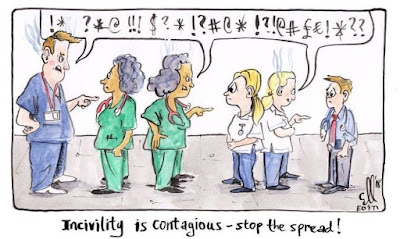Civility, a moral duty, or a competitive advantage for your dental practice?
In the world of dentistry, where patient care and teamwork are paramount, the atmosphere within a dental practice can significantly influence not only the patients but also the entire team. Incivility and civility, or the lack thereof, play crucial roles in shaping the work environment. In this blog, we will explore how incivility and civility manifest in dental practices, the short-term and long-term consequences, and how fostering a culture of civility can lead to positive outcomes for the team, finances, and reputation.
Civility is the act of showing respect, courtesy, and kindness to others, regardless of their differences or opinions. It is a vital component of a healthy and productive workplace, especially in a dental practice where teamwork, communication, and patient satisfaction are essential. However, civility is often lacking in many workplaces, including dental practices. Incivility, often characterised by rudeness, disrespect, and unprofessional behaviour, can rear its ugly head in any workplace, including dental practices. When team members engage in incivility, it creates a hostile environment where trust erodes, morale plummets, and patient care may suffer:
How incivility may be exhibited
Interrupting or ignoring others
Making sarcastic or demeaning remarks
Spreading gossip or rumours
Taking credit for someone else's work
Excluding or isolating someone
Yelling or swearing at someone
Giving negative feedback in public
Micromanaging or undermining someone's authority
Blaming or criticising someone unfairly
Incivility can have serious consequences for both individuals and practices. It can negatively affect the mental and physical health, performance, and retention of employees, as well as the quality of care, patient satisfaction, and reputation of the dental practice, ultimately undermining the reputation and financial success. Here are some of the costs of incivility in a dental practice:
Mental and physical health
Incivility can cause stress, anxiety, depression, burnout, low self-esteem, insomnia, headaches, and other health problems for employees who experience or witness it. These health issues can impair their ability to work effectively and safely, as well as increase their absenteeism and turnover rates.
Performance
Incivility can reduce the productivity, creativity, collaboration, and engagement of employees. It can also impair their decision-making, problem-solving, and learning abilities. Team members who are treated poorly may intentionally decrease the quality or quantity of their work, avoid interacting with their colleagues or patients, or lose their commitment to the organisation.
Patient care
Incivility can compromise the quality and safety of patient care by creating errors, misunderstandings, delays, or omissions. It can also affect the patient-provider relationship by reducing trust, empathy, and rapport. Patients who witness or experience incivility may feel dissatisfied, anxious, or fearful about their treatment.
Reputation
Incivility can damage the reputation and image of the dental practice by creating a negative word-of-mouth among team members, patients, and other community members. Incivility can also result in negative social media reviews, complaints that will harm the credibility of individual clinicians and the profitability of the practice.
Given these costs, it is imperative for dental practices to foster a culture of civility among their team Civility can have many benefits for both individuals and practices. It can enhance the well-being, performance, and retention of employees, as well as the quality of care, patient satisfaction, and reputation of the dental practice. Here are some ways to increase civility in your dental practice:
Model civility
As a leader or manager of your dental practice, you have a responsibility to set an example of civil behaviour for your team, be the behaviour you want to see. Do this by treating everyone with respect and dignity, listening actively and attentively to others' opinions and concerns, giving constructive feedback and recognition appropriately, resolving conflicts constructively and respectfully.
Define the values and culture
When everyone knows what the values and culture of the practice and how they are honoured and violated, the consequences, being civil becomes the practice cultural norm. Use your values and culture as part of your standardised recruitment and retention processes to prevent incidences of incivility. Work with a coach who has experience with dental teams eliciting values and developing cultures.
Establish norms
Creating a shared understanding and expectation of civil behaviour among your team by establishing clear norms, boundaries, and policies for your dental practice. Use regular team meetings, team bonding and training days to define what constitutes civility and incivility in your practice. continue to communicate these norms, boundaries and policies to your daily huddle, quarterly reviews to reinforce them consistently and fairly, and rewarding those who demonstrate civility.
Educate your team
You can also help your team develop the skills and awareness to behave civilly towards each other by providing them with education, training, rewarding, and celebrating civility. You can do this by offering team bonding and training events on topics such as
Communication skills,
Thinking patterns,
Emotional intelligence,
Diversity and inclusion,
Conflict resolution,
Stress management, etc.
Empower your team
You can also empower your team to take ownership and responsibility for creating a civil workplace by involving them in the process of fostering civility. You can do this by inviting their input and feedback on how they would like to improve civility in your dental practice, creating opportunities for them to interact and collaborate with each other positively, so they have approaches, tips, resources, and support to deal with incivility if it occurs, etc.
By implementing these strategies, you can create a more civil, respectful, and harmonious workplace for your dental practice. This can benefit not only your team, and also your patients, your practice as a whole.
Engendering civility is not only a moral duty, it can also be a competitive advantage for your dental practice.
Further reading
Human factors: Civility saves lives | MDDUS. https://www.mddus.com/resources/publications/publications-library/insight-primary/q2-2021/human-factors-civility-saves-lives.
The impact of interprofessional incivility on medical performance .... https://www.rcpjournals.org/content/futurehosp/early/2023/03/11/fhj.2022-0092.full.pdf?download=true
What is Civility? Civility starts with you - American Nurse. https://www.myamericannurse.com/civility-starts-with-you/.

No comments:
Post a Comment